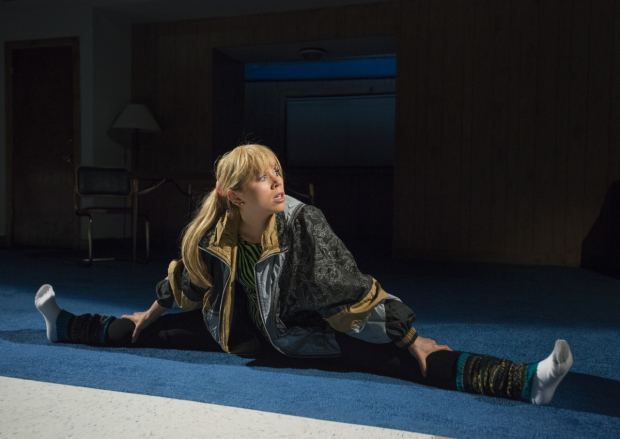
(© Michael Brosilow)
At a practice session for the 1994 U.S. Figure Skating Championships, a determining event for the Winter Olympics, a masked man attacked favored winner Nancy Kerrigan, who was wounded and had to withdraw. Underdog Tonya Harding won the event.
It's a safe assumption that most theatergoers will have some memory of the 1994 debacle, but in the world premiere of Dan Aibel's T., the script forgoes exposition at the cost of sometimes-needed context. Whole scenes in T. pass without the audience being given so much as a proper noun.
The assault was a shocking event on its own, but it quickly developed into a full-blown scandal days after the assault, when Harding's bodyguard Shawn Eckhardt (Nate Wheldon) confessed to hiring the assailant along with Harding's husband, Jeff Gillooly (Tyler Ravelson). Though Harding (Leah Raidt) has always maintained that she was ignorant of the plan, she pleaded guilty to conspiracy to hinder prosecution.
The performances, guided by director Margot Bordelon, all share a clipped, mechanical quality, like pieces of a tightly wound clock with Tonya posed at the center, just a little cuckoo. The stylized delivery is interesting, and there are occasional moments where it gels, notably in an early debate between Gillooly and Harding's coach, Joanne (Kelli Simkins). More often, though, it seems stilted.
That's not to say that the actors do a bad job. The cast is perfectly proficient, but the affectations in the script are difficult to overcome. The full extent of Harding's involvement in the attack is unknown, which may be why T. skirts the issue, never showing any moments of decision, only the conversations that come before or after anything really interesting happens. Kerrigan is never seen onstage, leaving Harding without a foil or any real conflict. Nonetheless, Raidt is pleasure to watch, burning with manic focus as Harding is revealed to be unstable and mercurial.
Simkins gives a strong, grounded performance as Joanne, the only character who isn't entirely rotten. The funny Ravelson deserves a better take on Gillooly, who has the ambition and amorality to match any of Shakespeare's villains, but lacks competence and luck. Ravelson must do his best with the script he was given, which means a lot of pacing, complaining, and quarrelling without any real meaning.
The play dabbles in addressing classism, the exploitation of athletes, and, in a particularly ham-fisted piece of dialogue, the burgeoning internet community. There is some success in the scene transitions, which feature an overlapping cacophony of media coverage designed by Miles Polaski. Stephanie Cluggish's costume design is period-specific but understated, never overindulging in nostalgia or camp.
The story of the attack on Kerrigan is well-trodden ground at this point. Chicago has already seen a rock opera on the subject this season, and there is a movie starring Margot Robbie in the works, as well as a number of other iterations. Ultimately, T. fails to bring anything new to the story, delivering only a limp, confusing mess.









